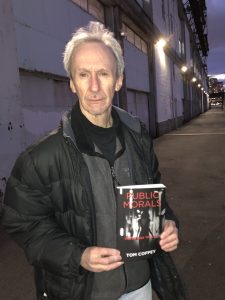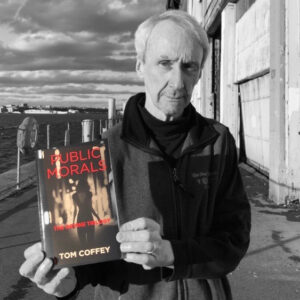 Mick Herron was a panelist and a featured guest at a couple of sessions I attended at the recently concluded Bouchercon mystery writers’ conference in Nashville. For the uninitiated, Herron is the author of the Slough House series, which is centered on a group of inept spies who have been exiled by British intelligence from main headquarters to a ramshackle office in a nondescript part of London above a Chinese takeout place. The books have been turned into the Slow Horses series on Apple TV. Gary Oldman plays the obnoxious boss of this dysfunctional bunch, and if you’ve read any of the books (I’ve read three), you’ll understand why he wanted the role.
Mick Herron was a panelist and a featured guest at a couple of sessions I attended at the recently concluded Bouchercon mystery writers’ conference in Nashville. For the uninitiated, Herron is the author of the Slough House series, which is centered on a group of inept spies who have been exiled by British intelligence from main headquarters to a ramshackle office in a nondescript part of London above a Chinese takeout place. The books have been turned into the Slow Horses series on Apple TV. Gary Oldman plays the obnoxious boss of this dysfunctional bunch, and if you’ve read any of the books (I’ve read three), you’ll understand why he wanted the role.
More than few commentators maintain that, in the realm of spy fiction, Herron is the new John le Carre. Now, if you put a gun to my head and asked me to name my favorite writer, I’d probably say le Carre. I’ve read most of his novels and always enjoyed his moral ambiguity, multidimensional characters and fluid writing. He was the Bard of the Cold War who was able to pivot late in his career, when he became the Cassandra of the War on Terror.
Le Carre’s writing was deeply informed by the years he spent in the British security services. When you read his books, you’re aware that the writer was enmeshed in the world he’s describing. Mick Herron is a writer and editor. Writers spy on things all the time, but not the way folks in the espionage business do. At Bouchercon he mentioned once being asked, when he was in the company of real-life spooks, if he’d ever been a spy. The real-life spooks laughed before he could answer the question.
Herron’s writing, unlike le Carre’s, is humorous and often satirical. He’s using the spy milieu to do a deep dive into the frequently bizarre worlds of office politics and government bureaucracies. In many ways, the Slough House series could be set in the Ministry of Agriculture — but then who would read it? Herron is playing a different game than le Carre was, and that’s a good thing.
The success of the Slough House series raises the question of whether “spy fiction” is a larger field than we think it is. Those books don’t necessarily have to be about skulduggery, and cloak-and-dagger operations. They can use a backdrop in which the consequences can be life or death to explore time-honored topics like trust, and love, and the precarious nature of the human condition. And, in the Slough House novels, the writer can also play with the concept of competence, often with hilarious results.



